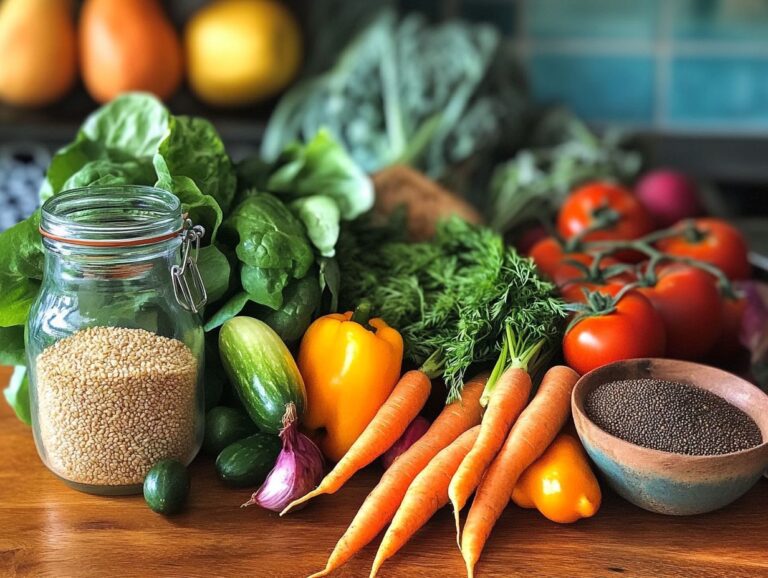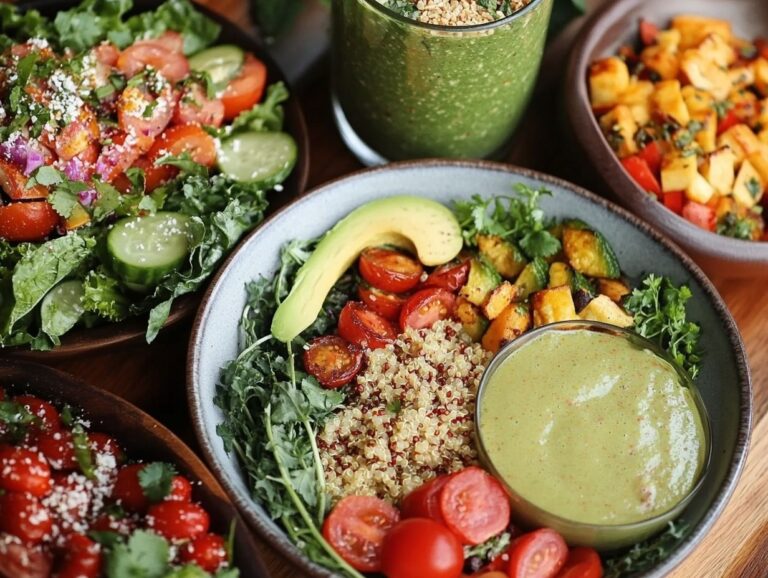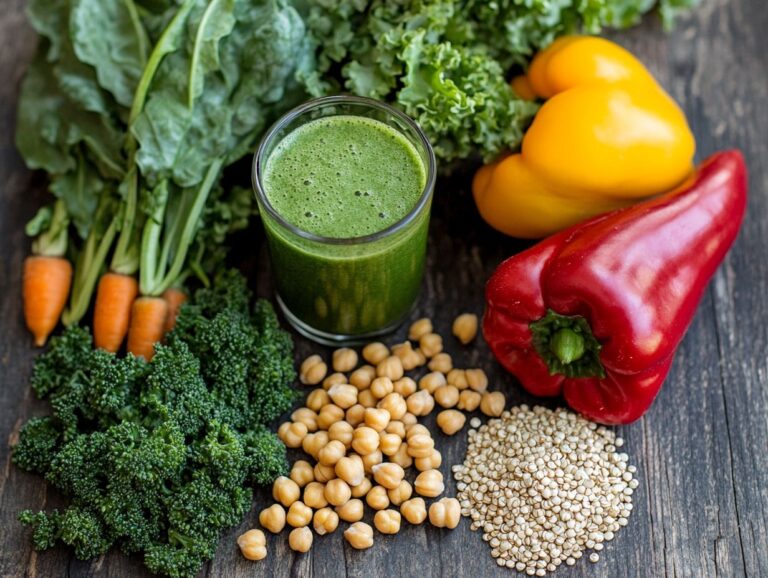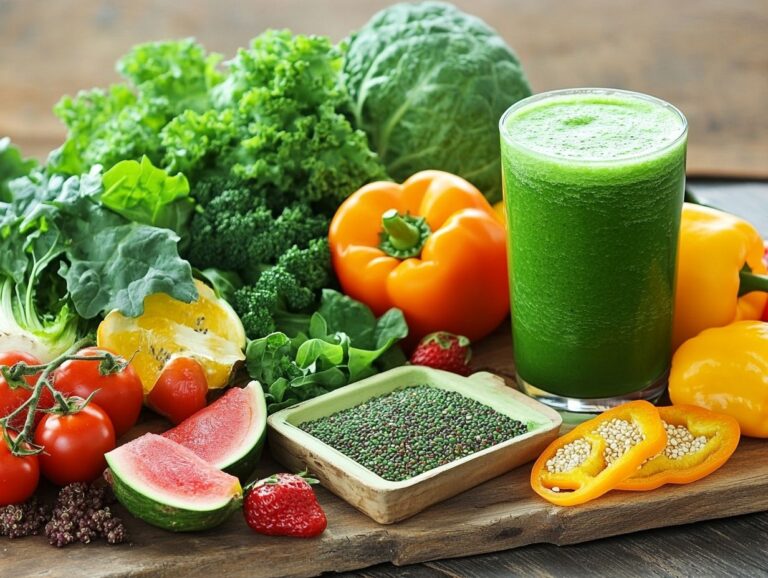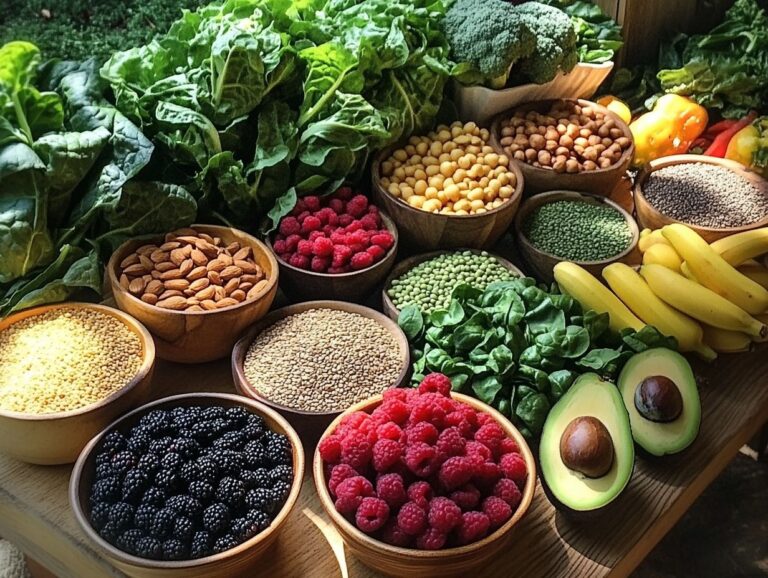Osteoporosis is a condition that weakens bones and increases the risk of fractures, affecting millions of people worldwide. As more individuals adopt plant-based diets, questions arise about the impact of these dietary choices on bone health. This article explores the causes and risk factors associated with osteoporosis, the essential nutrients needed for strong bones, and how a vegan diet can both support and challenge bone integrity. Additionally, readers will discover practical tips for optimizing their healthy plant-based diet to promote healthier bones while addressing potential pitfalls along the way.
What is Osteoporosis?

Osteoporosis is a significant public health concern characterized by reduced bone mineral density (BMD) and the deterioration of bone tissue, which increases the risk of fractures in the adult population.
Various dietary, lifestyle, and age-related factors influence the development of osteoporosis, making it essential to understand how these factors contribute to bone health and overall nutritional status. This condition is prevalent globally, with its frequency on the rise and serious health implications, particularly in the context of chronic diseases such as T2DM and CKD.
These implications stem from the association between osteoporosis and chronic diseases, as well as the effects of both healthy and unhealthy diets on bone health.
What Causes Osteoporosis?
The causes of osteoporosis are multifactorial, encompassing genetic, lifestyle, and dietary factors that collectively influence bone health and bone mineral density.
For instance, an insufficient intake of essential nutrients such as calcium, vitamin D, and vitamin K can lead to decreased bone mineral density. Additionally, energy intake and various dietary factors are crucial for maintaining nutritional status.
Lifestyle choices, particularly physical exercise—especially weight-bearing and resistance training—can promote increased bone mass and mitigate bone loss. Conversely, age categories and hormonal changes are also significant contributors to the risk of developing osteoporosis.
What Are the Risk Factors for Osteoporosis?
Osteoporosis risk factors encompass biological, behavioral, and environmental elements that increase the likelihood of developing the condition. These factors include an individual’s age category, smoking status, dietary habits, exercise habits, presence of chronic diseases like T2DM and CKD, and socioeconomic status.
Certain age groups are at a higher risk for developing osteoporosis due to the natural aging processes that affect bone mineral density (BMD). Behavioral risk factors consist of lifestyle choices such as smoking, diet, and physical activity. Environmental risk factors include chronic diseases and socioeconomic status.
Additionally, genetic predisposition plays a significant role, as individuals with a family history of osteoporosis tend to have lower BMD compared to those without such a history.
According to the Centers for Disease Control and Prevention’s National Health and Nutrition Examination Survey (NHANES) data in the US, nearly 20% of postmenopausal women were diagnosed with osteoporosis based on their bone density measurements. Other health issues, including rheumatoid arthritis, hormonal imbalances, and the use of certain medications, can exacerbate bone loss, further increasing risk among already vulnerable demographic groups.
How Does a Vegan Diet Affect Bone Health?
The relationship between a vegan diet and bone health is an increasingly important topic as more people shift towards plant-based options for health benefits and ethical reasons.
While a well-planned vegan diet can offer numerous health benefits and promote overall well-being, there are concerns about its ability to provide essential nutrients necessary for maintaining bone mineral density and preventing osteoporosis, especially in the context of dietary restrictions.
Key nutrients such as calcium, vitamin D, and vitamin K are vital for optimal bone mineral density and bone health. Therefore, it is crucial to closely monitor the intake levels of these nutrients in a vegan diet to ensure proper nutritional status.
What Nutrients are Important for Strong Bones?
The key nutrients essential for strong bones and the prevention of osteoporosis are calcium, vitamin D, and vitamin K. These three nutrients are vital for bone mineralization and overall bone health. Calcium is a primary building block of bone tissue and is predominantly found in bones.
Vitamin D plays a crucial role in the body’s utilization of calcium by enhancing its absorption in the intestines. Meanwhile, vitamin K is important for bone metabolism and mineralization, contributing to both bone mass and mineral density.
To improve nutrient density, dietary patterns should include a variety of foods rich in these vitamins and minerals, adhering to established dietary guidelines. If necessary, dietary supplements can be added to help meet daily requirements.
For individuals following a vegan diet, leafy greens and cruciferous vegetables, such as kale and broccoli, are excellent sources of both calcium and vitamin K, supporting a healthy plant-based lifestyle. Additionally, fortified plant milks and tofu are good alternatives.
For non-vegan diets, vitamin D can be obtained from dairy products like yogurt and cheese, as well as from fatty fish. The body can also synthesize vitamin D through exposure to sunlight.
It is especially important for older adults or those with dietary restrictions to monitor their calcium intake, as low levels can lead to weakened bones and an increased fractures risk. Supplementation may serve as a reliable alternative to bridge nutritional gaps, promoting optimal bone health and proactively preventing osteoporosis.
How Can a Vegan Diet Provide these Nutrients?
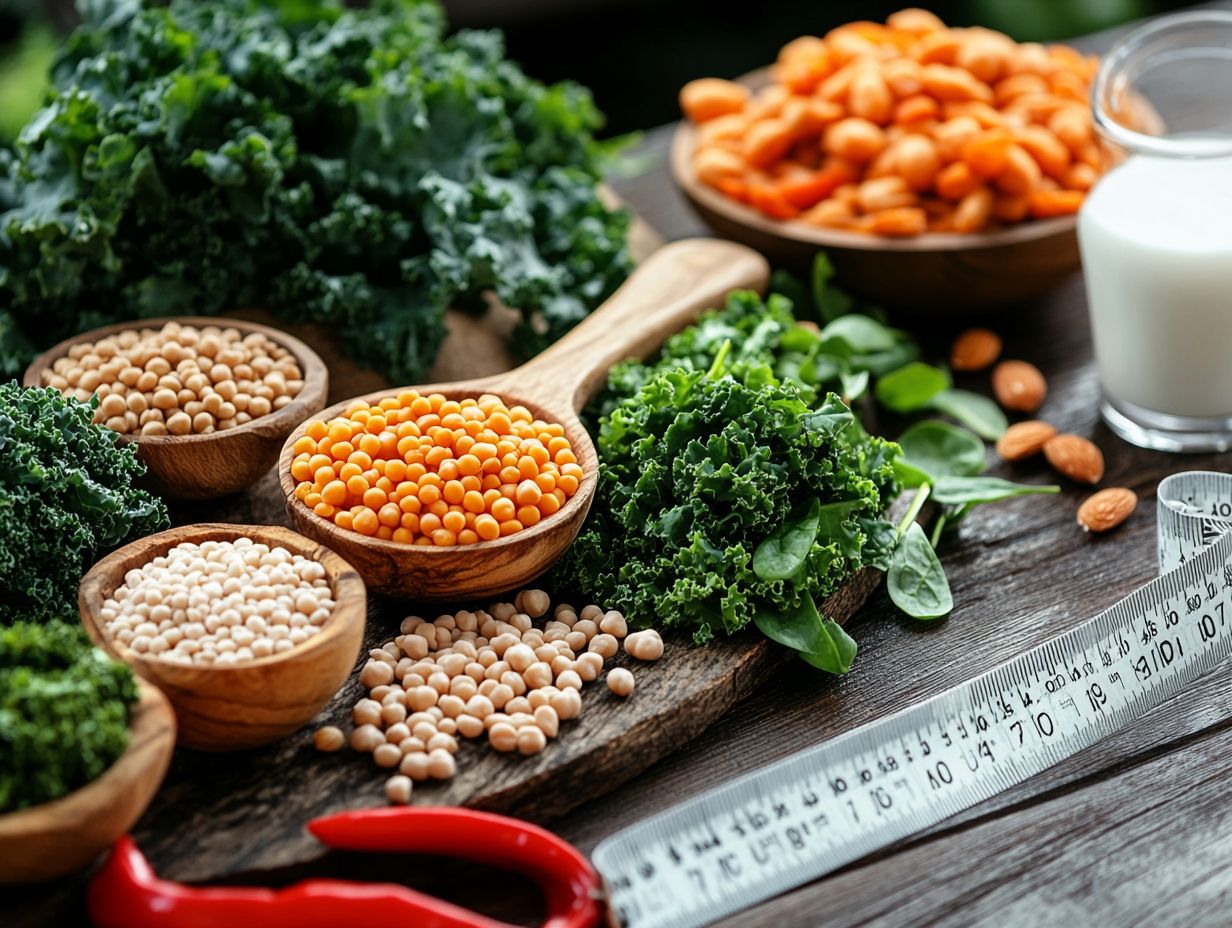
A vegan diet can provide essential nutrients needed for strong bones by incorporating plant-based foods rich in calcium, vitamin D, and vitamin K. Many leafy greens, nuts, seeds, and fortified products are excellent sources of calcium, while vitamin D can be obtained through sunlight exposure and fortified foods. Specific plant sources of vitamin K, such as kale and broccoli, contribute to bone health, demonstrating that diverse and nutritious plant-based dietary choices can support optimal bone mineral density.
Incorporating various foods high in calcium, vitamin D, and vitamin K into daily meals is quite simple.
For example:
- A breakfast smoothie made with fortified almond milk, chia seeds, and a handful of spinach offers both calcium and vitamin K.
- For lunch, a salad featuring kale, sunflower seeds, and avocado provides a powerful combination of calories and essential nutrients.
- For dinner, a tofu stir-fry with bok choy delivers the dual benefits of calcium and vitamin K.
Additionally, fortified plant-based yogurts or cereals can help meet vitamin D requirements, and regular sun exposure should be taken advantage of whenever possible. By including these foods and planning meals thoughtfully, anyone can easily meet their calcium, vitamin D, and vitamin K needs on a vegan diet.
What Foods Should be Avoided on a Vegan Diet for Bone Health?
A vegan diet can support bone health, but it is essential to avoid certain unhealthy plant-based foods and dietary practices to reduce the risk of osteoporosis and fractures.
Processed foods high in sodium and refined sugars can be detrimental to bone density and overall health. Additionally, excessive consumption of caffeine and certain oxalate-rich foods, such as spinach and rhubarb, may hinder calcium absorption and should be limited to maintain the proper calcium levels necessary for strong bones.
To promote bone health, individuals following a plant-based diet need to be mindful of their food choices. Including whole foods, such as fortified plant-based milks, kale, and almonds, can help provide essential micronutrients.
Furthermore, legumes and whole grains offer sufficient protein intake without interfering with calcium absorption. Selecting foods that enhance calcium and vitamin D intake can significantly benefit bone health for those on a vegan diet.
What are Other Ways to Strengthen Bones on a Vegan Diet?
Plus a mineral-rich vegan diet, other lifestyle modifications can contribute to stronger bones and enhance overall bone health.
Engaging in regular exercise, particularly resistance training, is essential for building and maintaining bone mineral density, which is crucial for preventing osteoporosis.
Adequate sun exposure is necessary for the synthesis of vitamin D, while dietary supplements can be beneficial if nutrient intake from food alone is insufficient to support optimal bone mineral density. Sensitivity analyses and logistic regression models in various studies highlight the importance of these lifestyle changes.
Regular Exercise
Regular exercise, particularly weight-bearing and resistance training, is essential for maintaining bone health and can help prevent osteoporosis and bone loss in individuals following a vegan diet. Engaging in regular physical activity promotes bone formation and helps maintain or increase bone mineral density in the adult population over time.
Specifically, a combination of strength, balance, and flexibility exercises can significantly reduce the risk of falls and fractures in adults. The best results are achieved when individuals participate in these types of exercises at least three to five times a week.
Strength exercises to build strength include:
- Weight lifting
- Resistance band training
- Body-weight exercises such as squats and lunges
Weight-bearing exercises that support bone health include:
- Brisk walking
- Jogging
- Dancing
Balance exercises to enhance stability and coordination include:
- Tai chi
- Yoga
Supplements
Dietary supplements play a crucial role in maintaining bone health, particularly for individuals following a vegan diet, as they may struggle to meet their calcium and vitamin D requirements through food alone. These supplements can compensate for insufficient dietary intake, helping to optimize nutrient density and preserve bone mineral density. Additionally, including supplements in one’s dietary pattern can enhance overall bone health and reduce the risk of osteoporosis and fractures.
However, it is essential to consult with healthcare providers before taking any supplements to ensure the appropriate dosages and combinations that best support individual health needs and take into account factors such as age categories, socioeconomic status, and smoking status. For vegans, these supplements are especially important, as they often lack access to fortified foods that are significant sources of these vital nutrients, impacting their dietary habits.
It is advisable to choose high-quality supplements that have been rigorously tested for purity and potency, considering health implications and public health concerns. Additionally, seeking vegan-friendly formulations with optimal bioavailability is recommended, which can support better health outcomes and nutrient density.
With the guidance of healthcare providers, a personalized supplement strategy can not only enhance bone health but also address other nutritional deficiencies, enabling vegans to adhere to their dietary beliefs without compromising their health. This approach can also consider individual dietary patterns and lifestyle changes needed for optimal bone mineral density and reduction of mineral density risk.
Sun Exposure
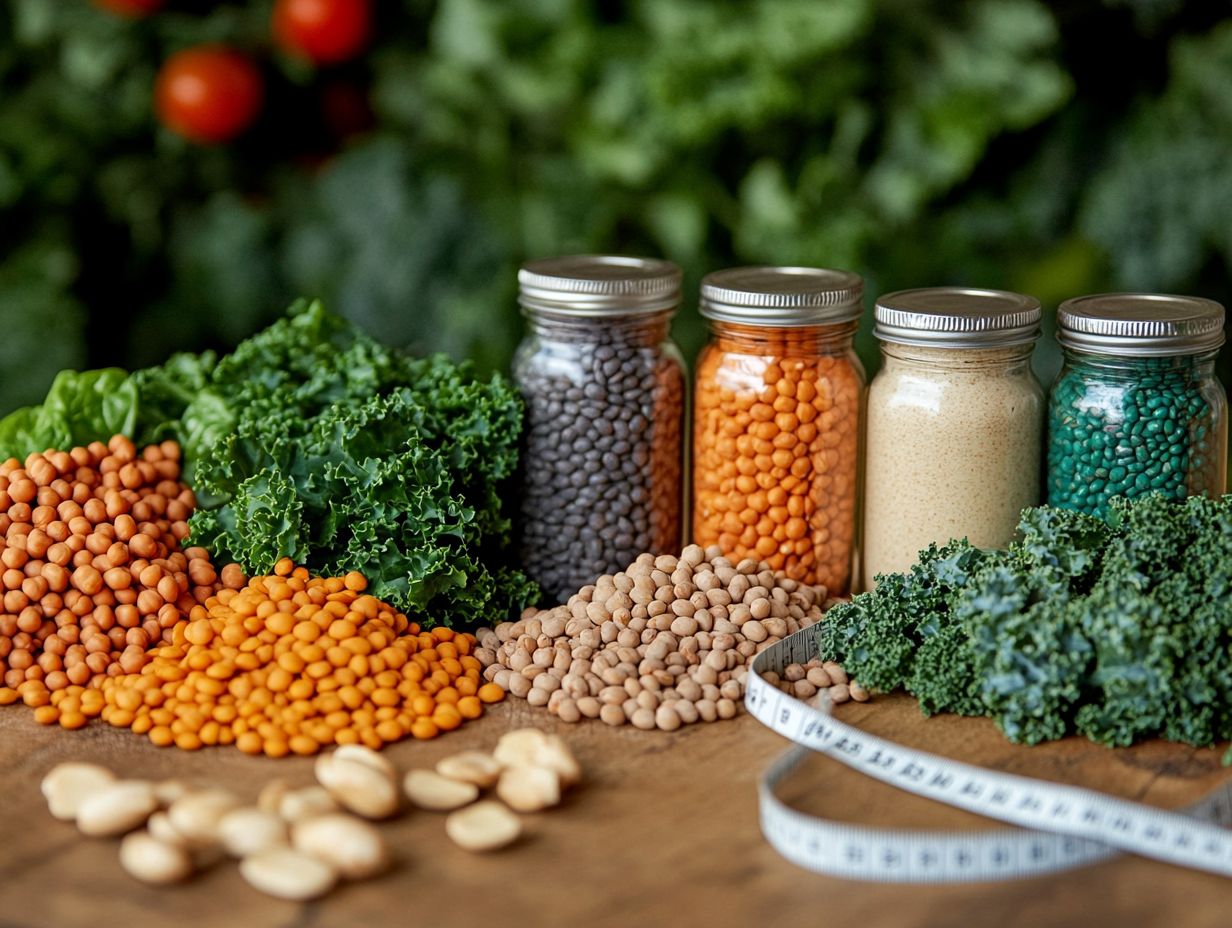
Adequate sun exposure is essential for the production of vitamin D, which plays a significant role in maintaining bone health and preventing osteoporosis. Vitamin D is crucial for the intestinal absorption of calcium, and without sufficient sunlight, some individuals may struggle to maintain adequate levels of this vital nutrient.
For those following a vegan diet, sun exposure can help ensure proper levels of vitamin D, supplementing dietary sources and reducing risk factors for bone loss and osteoporosis. Engaging in outdoor physical exercise can further enhance the synthesis of this essential nutrient.
Geographical location significantly affects the amount of sun exposure one receives throughout the year. Areas further from the equator may experience longer winters with less sunlight, making it more challenging for individuals to meet their vitamin D needs through natural means. This can be a public health concern, especially for those with specific dietary restrictions or those in the adult population.
Therefore, incorporating safe sun practices—such as spending short periods outside, especially around midday when ultraviolet rays are strongest, while also applying sunscreen to prevent skin damage—can enhance overall vitamin D production.
By being aware of these factors, individuals, especially those on a vegan diet, can help maintain good bone health and reduce their risk of deficiency. Incorporating dietary choices that align with dietary guidelines can support better health outcomes and minimize health risks.
What are the Benefits of a Vegan Diet for Osteoporosis?
A vegan diet offers numerous advantages for individuals concerned about osteoporosis, primarily due to its higher nutrient density, which can combat chronic disease and inflammation. Nutritional status, including calcium intake, vitamin K, and vitamin D levels, plays a significant role in this regard.
Plant-based diets are rich in naturally occurring antioxidants and anti-inflammatory compounds that contribute to overall health and may lower the risk of osteoporosis-related complications. Additionally, the greater emphasis on whole foods inherent in a vegan diet helps ensure sufficient levels of calcium and vitamin D, both of which are essential for maintaining bone mineral density. These dietary patterns, whether healthy plant-based (hPDI) or unhealthy plant-based (uPDI), significantly influence bone health outcomes and chronic diseases.
Lower Risk of Chronic Diseases
One of the notable advantages of following a vegan diet is the reduced risk of chronic diseases, which can indirectly benefit bone health and lower the risk of osteoporosis. Research indicates that plant-based diets are associated with lower incidences of conditions such as type 2 diabetes (T2DM), chronic kidney disease (CKD), and certain cancers, all of which can negatively impact bone health and overall well-being. These health benefits are closely related to sensitive analyses of dietary adjustments based on NHANES data and dietary recall studies.
By emphasizing whole, nutrient-dense foods, a vegan diet promotes better health outcomes and contributes to improved bone mineral density. This is particularly significant given that chronic conditions often lead to declining health over time, including weakened bones. Such dietary habits can help manage energy intake and provide confidence intervals for evaluating health risks associated with bone mineral density loss.
A study published in the Journal of Bone and Mineral Research found that individuals adhering to a vegan lifestyle exhibited greater bone density than their omnivorous counterparts, likely due to higher intakes of potassium, magnesium, and vitamin K, all of which are essential for bone strength. This study also utilized BMD assessment techniques to provide insight into the health outcomes of different dietary patterns.
Additionally, avoiding animal products can reduce inflammatory markers in the body, which is another critical factor in maintaining bone integrity. Therefore, adopting a vegan diet not only minimizes the risk of chronic diseases but also plays a vital role in enhancing skeletal health. Such lifestyle changes can be critical in managing health benefits and reducing fractures risk among study participants.
Lower Risk of Inflammation
Adopting a vegan diet may reduce the risk of inflammation, which is crucial for maintaining bone health and preventing osteoporosis. Plant-based diets are naturally rich in antioxidants and anti-inflammatory compounds, helping to mitigate chronic inflammation that can lead to bone loss and osteoporosis. This dietary choice can significantly alter the nutritional status and mineral density risk among different groups.
By making dietary choices that reduce inflammation, individuals can potentially enhance their overall bone health and decrease the risk of fractures. This is particularly relevant, as certain foods are known for their significant anti-inflammatory effects. Including resistance training in one’s routine can further support bone strength and reduce the risk of fractures.
For instance, leafy greens like kale and spinach, as well as berries such as blueberries and strawberries, are rich in antioxidants that help reduce oxidative stress.
Additionally, spices like turmeric and ginger are recognized for their strong anti-inflammatory properties. Incorporating these foods into a balanced vegan diet not only supports the body’s inflammatory processes but also contributes to maintaining strong and healthy bones, making it a vital component of osteoporosis prevention for those following a vegan lifestyle.
Lower Risk of Acidic Diet
A vegan diet is often rich in alkaline foods, which can reduce the risk of an acidic diet that may negatively impact bone health. High acidity in the diet has been linked to calcium leaching from bones, leading to lower bone mineral density and an increased risk of fractures. Implementing dietary guidelines that promote alkaline foods can mitigate these risks and support better health outcomes.
The positive effects of a low-acid diet on bone health can be enhanced by incorporating alkaline foods such as fruits and vegetables, which help counteract acidity and support bone preservation. This shift towards an alkaline environment aids in retaining important minerals and contributes to overall health. Understanding the inclusion criteria for dietary analysis can provide insights into the effectiveness of such dietary patterns.
For instance, foods high in potassium, like bananas and leafy green vegetables, not only promote alkalinity but also enhance the body’s ability to utilize calcium effectively. Individuals can mitigate dietary acidity by incorporating legumes and nuts, which are plant-based protein sources that help neutralize the acidifying effects of certain foods. This approach aligns with healthy plant-based dietary indexes (hPDI) that support bone preservation.
Adopting a vegan lifestyle not only fulfills ethical and moral responsibilities toward other living beings but also serves as a proactive approach to improving and maintaining bone health. This lifestyle can also involve logistic regression analysis to evaluate dietary effects on bone health and the potential for chronic disease prevention.
What are the Potential Risks of a Vegan Diet for Osteoporosis?
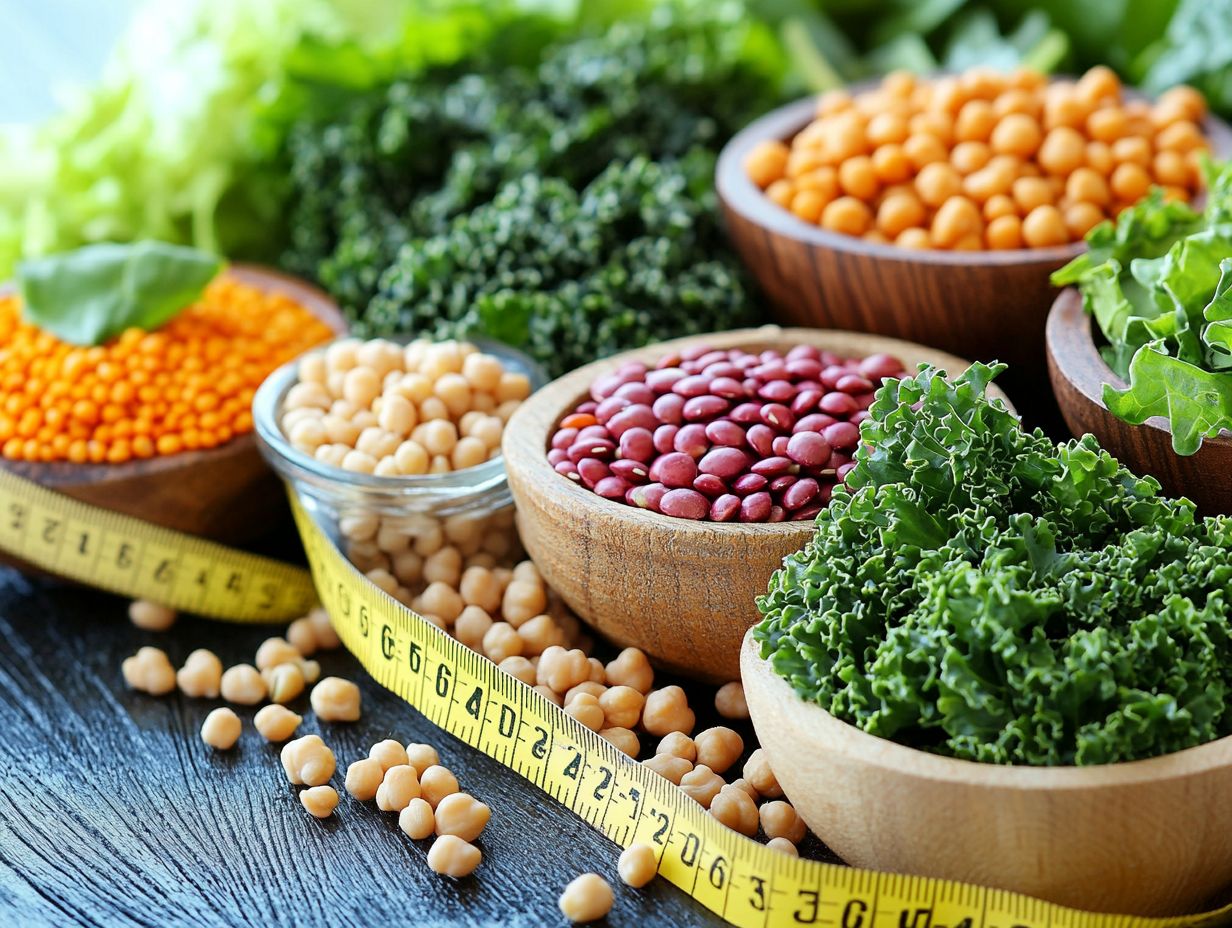
A vegan diet offers numerous benefits; however, it also presents potential risks for osteoporosis that necessitate careful management to ensure adequate nutrient intake. Proper dietary analysis is essential to identify any exclusion criteria that may affect nutrient absorption and mineral density.
Key concerns include insufficient calcium, which is essential for maintaining bone mineral density and preventing fractures, as well as inadequate protein intake, which is also crucial for bone health.
Insufficient Nutrient Intake
One of the primary concerns of a vegan diet is the risk of insufficient nutrient intake, which can lead to poor bone health and an increased likelihood of developing osteoporosis. Diets that lack essential vitamins and minerals, such as calcium, vitamin D, and protein, can result in dietary deficiencies, negatively affecting bone mineral density and overall health.
Therefore, proper planning and a thorough understanding of nutrient sources are crucial for individuals following a vegan diet. For optimal bone health, those on a vegan lifestyle should consume a variety of food sources rich in these essential nutrients. Utilizing NHANES data can guide individuals in making informed dietary choices to enhance their overall nutritional status.
- Leafy greens like kale and collard greens
- Fortified plant-based milks
- Tofu
These are excellent sources of calcium. Additionally, exposure to sunlight and the consumption of vitamin D-fortified foods can help meet the body’s vitamin D requirements. Legumes, nuts, and seeds provide the necessary protein needed for maintaining bone tissue. Considering socioeconomic status and age categories can further refine dietary recommendations.
For individuals who may not obtain adequate nutrients through diet alone, consulting with a healthcare provider about supplementation can be an effective way to prevent deficiencies and promote overall skeletal health.
Low Calcium Levels
Low calcium levels are a common issue for individuals on a vegan diet and pose a significant risk factor for osteoporosis and poor bone health. Calcium is essential for maintaining bone mineral density, and without sufficient intake from dietary sources, the likelihood of fractures and other complications increases dramatically. Awareness of dietary recall methods can aid in addressing these deficiencies effectively.
Therefore, it is crucial to identify appropriate plant sources of calcium and ensure they are included in daily dietary routines. To effectively obtain these necessary nutrients, individuals should consider a variety of options, such as understanding dietary indexes and their role in maintaining bone health:
- Leafy greens (like kale and bok choy)
- Fortified plant-based milk
- Almonds
- Tofu
All of which can be easily incorporated into meals and snacks. Planning meals in advance can greatly assist in achieving adequate calcium intake. This not only helps maintain proper bone health but also ensures individuals meet their dietary needs.
Inadequate Protein Intake
Inadequate protein consumption poses a potential risk to bone health in a vegan diet and may lead to osteoporosis. Protein is essential for building and maintaining muscle mass, which is necessary for ensuring bone strength and stability. Resistance training can complement dietary intake to support muscle and bone health effectively.
Insufficient protein intake can result in sarcopenia, the gradual loss of muscle mass and strength, which is associated with an increased risk of falls and, consequently, fractures. This underscores the importance of dietary guidelines in addressing protein intake as part of a comprehensive approach to bone health management.
In a plant-based diet, which is a popular dietary pattern, it is crucial to find and consume adequate amounts of protein in daily meals. Foods such as:
- lentils
- chickpeas
- quinoa
- tofu
- a variety of nuts
are rich in protein and can be easily incorporated into a balanced diet. Recommendations suggest a daily protein intake ranging from 0.6 grams to 2.2 grams for every kilogram of body weight, highlighting the importance of careful meal planning in maintaining an optimal nutritional status.
Additionally, engaging in resistance training can further strengthen skeletal tissues and improve overall bone mineral density. Increased muscle strength provides better support for bones, reducing the risk of osteoporosis and contributing to the development of a healthy skeletal structure.
How Can a Vegan Diet be Modified for Optimal Bone Health and to Minimize Fractures Risk?
To enhance bone health and reduce the fractures risk, nutritional modifications to a vegan diet should include the incorporation of calcium-rich foods and protein-dense plant foods, along with considerations for reducing other dietary factors that may increase the risk of developing osteoporosis.
Fortified plant milks, leafy green vegetables, legumes, and nuts are excellent sources of calcium, while beans, lentils, and tempeh are among the best sources of protein. By adding these foods to a vegan diet, individuals can address common nutrient deficiencies and improve bone mineral density.
Incorporating Calcium-Rich Foods
Incorporating calcium-rich foods into a vegan diet is essential for enhancing bone health and preventing osteoporosis. Plant-based sources that are high in calcium include fortified plant milks, tofu, almonds, and green leafy vegetables such as kale and collard greens. Consuming a variety of these foods throughout the day can significantly increase calcium intake and help meet overall nutritional requirements.
For breakfast, consider adding fortified almond milk, which is naturally higher in calcium than other plant milks, to a smoothie with spinach and a banana. For lunch, enjoy a hearty kale salad topped with sliced almonds and a lemon-tahini dressing. A delicious snack option could be crispy roasted chickpeas seasoned with spices. In the evening, a tofu stir-fry with broccoli and sesame sauce provides an excellent way to increase calcium consumption.
Eating a diverse range of these calcium-rich foods not only enhances the flavor of meals but also ensures a balanced intake of nutrients. This promotes healthier bones, reduces the risk of osteoporosis, and contributes to better overall health.
Including Protein-Rich Plant Foods
Incorporating protein-rich plant foods into a vegan diet is essential for maintaining muscle mass and supporting bone health, thereby helping to prevent osteoporosis and other chronic diseases. Excellent sources of plant-based protein include lentils, chickpeas, quinoa, and a variety of seeds and nuts.
These foods can be easily integrated into meals throughout the day, allowing individuals to meet their protein needs while also benefiting from other vital nutrients.
To enhance nutritional value and nutrient density, protein-rich foods can be blended into smoothies, added to salads, or prepared as lentil stew. Quinoa serves as a versatile side dish for many meals, while nuts and seeds can be sprinkled on yogurt or oatmeal, contributing to better dietary choices.
To address other dietary requirements, these protein sources can be paired with healthy fats and complex carbohydrates. For instance, a quinoa bowl topped with avocado and mixed vegetables creates a balanced meal that provides essential vitamins and minerals necessary for overall health, aligning with dietary guidelines.
Considering Supplements
Supplements are essential for maintaining optimal bone health in a vegan diet. They play a crucial role in ensuring adequate intake of calcium, vitamin D, and vitamin K, particularly when dietary sources may be insufficient.
For individuals who may not meet their nutrient requirements through food alone, supplements offer a practical solution to boost their intake. The appropriate types and amounts of supplements can be determined in consultation with healthcare professionals to align with an individual’s dietary needs and health goals.
Beneficial options for those following a vegan lifestyle include:
- Calcium sourced from algae
- Fortified plant-based milks
- Vitamin D2 or D3 derived from lichen
Since factors such as age, sex, and activity levels create significant variability in individual nutrient needs, personalized solutions are essential. Seeking professional guidance helps in selecting the right products and understanding absorption needs, ensuring that individuals can identify and address their specific deficiencies for optimal health.
